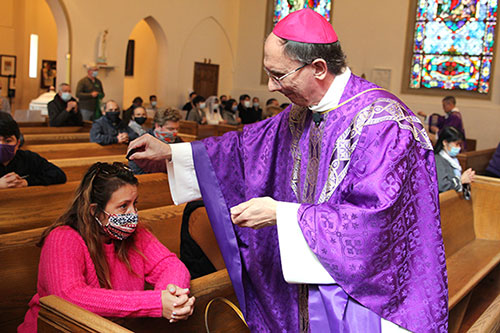‘Remember that you are dust, and to dust you shall return’
 CHARLOTTE — Ash Wednesday looked different this year due to the COVID-19 pandemic, now entering its second year.
CHARLOTTE — Ash Wednesday looked different this year due to the COVID-19 pandemic, now entering its second year.
This year’s midday Mass Feb. 17 at St. Patrick Cathedral was streamed live on the Diocese of Charlotte’s YouTube channel so people homebound during the pandemic could participate remotely. Churches across the diocese also added more Ash Wednesday Masses to accommodate more worshipers in person while ensuring limited, socially distanced capacities.
Another change was in the distribution of ashes: ashes were sprinkled on people’s head rather than placed on their forehead in the shape of a cross, following instructions from the Vatican. This alternative way of commemorating Ash Wednesday is still popular in Rome, and more closely resembles Old Testament tradition.
During a brief homily before distributing ashes to people as they knelt in the pews, Bishop Peter Jugis explained the significance of the ashes – no matter which way people receive them.
“Ashes are a sign of sorrow for our sins and our wrongdoing. Ashes are a sign of penitence,” he said.
“They are an acknowledgment that we have sinned – and not only that we have sinned, but that we are sorry for our sins and we are begging God for the grace of conversion, to have a change of heart and to receive His grace to be cleansed of our sins.”
“So how do we know what our sins are?” he continued. “Look to the 10 Commandments. Jesus says, ‘If you love me, you will keep my commandments.’
Of course we love Jesus – that is why we are here. And because we love Jesus we are sorry for our sins, sorry for any way we have offended Him – and out of love for Him (sorry for how we have) failed in loving others.”
Bishop Jugis then blessed the ashes, sprinkling them with holy water.
Standing at the top of the sanctuary steps he addressed the congregation, “Remember that you are dust, and to dust you shall return,” before descending the sanctuary steps to silently sprinkle the ashes on the heads of the faithful, weaving in and out of the pews as he worked his way to the back of the church.
Bishop Jugis was assisted at Mass by Deacon Paul Bruck, who also distributed ashes to the limited-capacity crowd.
Ash Wednesday marks the beginning of Lent, a 40-day penitential period of fasting, prayer and almsgiving before Easter.
— SueAnn Howell, senior reporter

